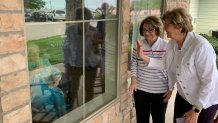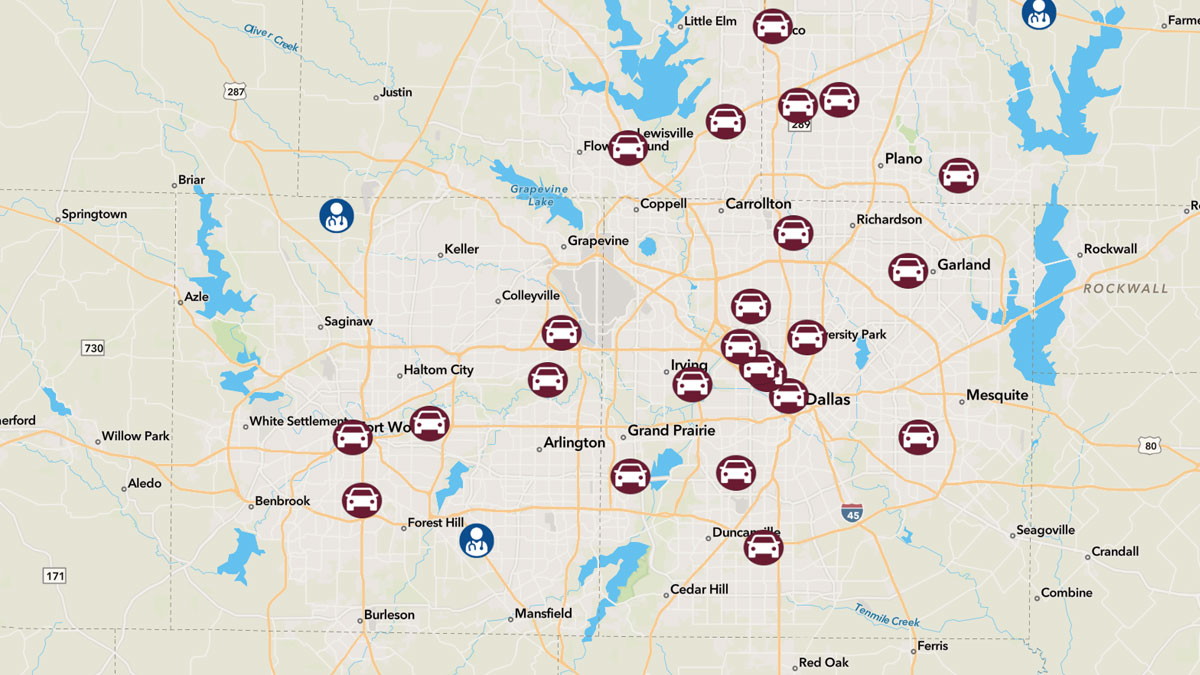For the first time in five months, families will be able to visit their loved ones at nursing and long-term care facilities.
The Texas Health and Human Services Commission approved limited visitation rules for nursing facilities and long-term care facilities on Thursday, provided that there is no physical contact and that the facility has been free from COVID-19 infections for at least 14 days.
Phil Wilson, the executive commissioner of the Texas HHSC, said they are constantly assessing what actions need to be done to keep residents and staff safe, but that “by following these procedures and rules, facilities can more effectively prevent the spread of COVID-19 and help us achieve our shared goal of reuniting residents with their families and friends.”
This is also big news for mental health advocates like Ashley Osborn, a behavioral health regional manager for Dallas-based AccentCare.
AccentCare specializes in hospice and elderly in-home care for chronic conditions, including those who were recently discharged from the hospital and need continued care at home.
Osborn oversees a team of behavioral health nurses and therapists who work with senior care facilities across Texas. She said many of their patients have been feeling the effects of long term isolation.
"They’re not only very isolated and very sad and very motivated but they are also very scared about what the future holds," she said.
Osborn said it has been especially difficult for Alzheimer's and dementia patients and their families.
"We've had a lot of increased depression patients. And it's not just depression, it's despair. It's that they don't for see the situation getting better," she said. "So they lose, not necessarily the will to live, but when every day is exactly the same and there's no improvement, then you don't have the want to get up."
AccentCare documented the effects of isolation in a blog post over the summer.
Osborn said over the course of the pandemic, her team has had a difficult time gaining access to certain facilities due to restrictions.
"We’ve been getting requests for our nurses to only go to one singular facility. The facilities are requesting that if they come to a specific facility, they are not to go to any other ones," she said.
That lack of access has made it hard but she said her behavioral health staff has been making great strides in connecting with older adults. Their work is essential because they work with patients to bring anxiety down with relaxation techniques, exercises and therapy.
Osborn said they're also continuing to find creative ways to connect with seniors, like sending activity baskets full of puzzles, crosswords, and other goodies to memory care facilities.
Staff have even organized social distance bingo, painting and live music.
"We’re going to keep putting our heads together to see what we can do to improve the situation and how we can partner better with these facilities," Osborn said.
It's a reminder for families to stay strong and consistent in connecting with their loved ones until the situation improves.
"My grandmother is in an assisted living facility. She has severe dementia so she's in a locked facility. We're going through the same thing, no one's allowed in to see her," Osborn said. "It's difficult but we're going to make it through one way or another."
“I think it will really help them(residents), whether they are there for long term care or rehabilitation. I think for both aspects it will help them,” said Michael Reynolds with Advanced Healthcare Solutions.
Statewide, Advanced Healthcare Solutions has dozens of facilities and plans to roll out the new protocols in weeks to come.
In Dallas County, Health and Human Services Director Dr. Phillip Huang said he supports the new protocols.
“I appreciate the efforts that they are trying to do to allow that to be done in a safe way,” said Huang via zoom.
Huang, however, did urge caution – citing recent surges of the virus in Dallas County when social distancing and other protocols were not followed.
“We are going to have to keep doing this, this has to be the new normal, we can’t let up,” said Huang. “I think what we have learned is how important it is we don’t let our guard down.”
The Texas Health Care Association, which represents healthcare workers inside care facilities, also supported the new protocols but urged caution.
In a statement, they told NBCDFW in part:
"While we are encouraged by yesterday’s announcement, families have already begun to ask about visiting, but many questions about the testing requirements and additional conditions remain unclear to begin scheduling those visits.”
The new state rules on visitation comes the same week a group of families petitioned the state to make such changes.
The new rules, as published by the Texas HHSC, are below.
Nursing Facilities
- For the health and safety of facility residents and staff, public visitation is limited to outdoor visits only. Physical contact between residents and visitors is not permitted. Additional conditions a facility must meet to conduct limited outdoor visitation include:
- No confirmed positive COVID-19 cases in staff in the last 14 days.
- No active positive cases in residents.
- Any facility previously experiencing an outbreak that has fully recovered must be adequately staffed and following adequate infection control procedures.
- Facility staff are being tested for COVID-19 weekly.
- Further guidance on limited nursing facility visitation rules, which include window visits and vehicle parades, will be posted on the HHSC COVID-19 provider web page.

Long-Term Care Facilities (except Nursing Facilities)
- Limited indoor and outdoor visitation procedures are allowed. Physical contact between residents and visitors is not permitted. Additional conditions a facility must meet to conduct limited visitation include:
- No confirmed COVID-19 positive staff in last 14 days.
- No active positive cases in residents.
- Adequate staffing to facilitate visitation in compliance with infection control requirements.
- Use of plexiglass as a safety barrier for indoor visitation to prevent spread of COVID-19.
- Further guidance on limited indoor and outdoor visitation rules will be posted on the HHSC COVID-19 provider web page.
The HHSC is also issuing enhanced emergency rules requiring additional actions by nursing facilities to mitigate the spread of COVID-19.
Emergency Rule Enhancements
- Enhanced emergency rules for nursing facilities include:
- Each facility must have a COVID-19 response plan that includes designated staff to work with cohorts of residents who have tested positive for COVID-19, and staff should not change designation from one day to another, unless required to maintain adequate staffing for a cohort.
- All nursing facilities must screen all residents, staff, and people who come to the facility in accordance with specified criteria, and each resident must be screened at least three times a day for signs or symptoms of COVID-19.
- Each facility must have plans for obtaining and maintaining a two-week supply of personal protective equipment and resident recovery plans for continuing care when a resident recovers from COVID-19.
The full emergency rules will be posted on the HHSC COVID-19 provider web page.
“Access to family and loved ones is an important part of every resident’s health and well-being, which is why this policy shift is a move in the right direction for some of our most fragile Texans,” said Sen. Lois Kolkhorst (SD-18), Chair, Senate Committee on Health and Human Services.
“Today’s announcement is a critical first step for every person in a long-term care facility and their loved ones,” said Rep. James Frank (HD-69), Chair, Texas House Committee on Human Services. “This decision underscores that state leaders recognize the need to balance the emotional and physical health impacts of isolation against the serious dangers that COVID poses to these vulnerable Texans.”


